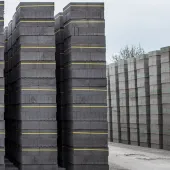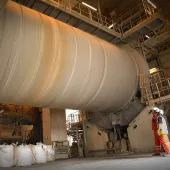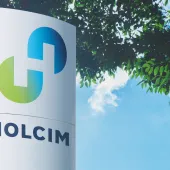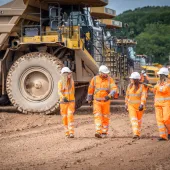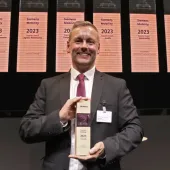Forterra pave the way towards low-carbon precast products
Almost one-third of company’s sites now using low-carbon concrete in precast products
FOLLOWING pioneering trials in 2022, experimenting with Hanson’s CEM II cement and alternative admixtures, Forterra say their Hoveringham facility in Nottinghamshire is now running entirely on CEM II cement, which has reduced the site’s weekly CO2 output by more than 40 tonnes, or approximately 750 tonnes since the switch from CEM I.
CEM II has a lower clinker content than traditional CEM I cement and, as clinker requires very high temperatures in excess of 1,400°C to manufacture, reducing the clinker content in cement helps reduce carbon emissions. Using admixtures also reduces the curing temperatures and improves early strength, further reducing the carbon footprint.
Forterra’s Whittlesey site in Peterborough has also switched from CEM I to CEM II, benefiting from 5% carbon reduction for each tonne of cement used. These positive results have led to further trials taking place at Milton with the hope of making the switch to CEM II there too.
In addition, alternative admixtures are being trialled at Somercotes, focusing on optimizing cement contents to improve the reject rate and reduce the need for secondary finishing. Lower-carbon mixes have been developed for specific projects, and Forterra are now working on introducing CEM II into the production schedule while trialling digital technology that aids efficiency.
Forterra chief executive Stephen Harrison said: ‘As a company, we have set ambitious ESG targets to reduce our carbon emissions by a further 32% by 2030, and I’m very proud that we’re on our way to achieving them.
‘We are always looking for ways to help the environment and operate more sustainably, so it’s brilliant to have such a driven R&D department determined to find solutions to lower our carbon footprint. To have almost a third of our sites utilizing low-carbon concrete is a fantastic achievement.’
Andy Murphy, commercial director for Hanson UK, commented: ‘We are committed to helping our customers meet their net-zero objectives, so it has been great to work with Forterra to introduce our recently developed CEM II cement, which has helped reduce the carbon content of their products.’
Forterra say this investment follows a series of other sustainability measures, including a solar farm that will supply 70% of their electricity needs by 2025, a reduction in single-use plastic used to wrap their products, the use of HVO (biodiesel) fuel to power all mobile machinery at their Measham facility, and a £21 million investment in their haulage fleet.


